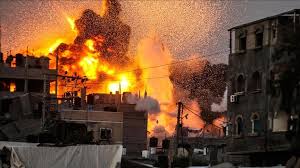Israel has launched a series of airstrikes on Syria’s capital, Damascus, targeting the Syrian Defence Ministry headquarters and areas around the presidential palace. The strikes, confirmed by the Israel Defense Forces (IDF), are part of what Israel says is a broader intervention to protect the minority Druze population in southern Syria, particularly around the city of Suweida.
The escalation follows violent clashes between Druze militias and Sunni Bedouin fighters in Suweida, sparked by the reported abduction of a Druze merchant. The UK-based Syrian Observatory for Human Rights reports that at least 200 people have died since the fighting began last weekend.
Israel’s Defence Minister, Yoav Gallant, warned of further action, stating, “The warnings in Damascus have ended – now painful blows will come.” He reaffirmed Israel’s commitment to defending Druze civilians, adding that Prime Minister Benjamin Netanyahu had ordered military strikes to prevent weapons being used against the Druze.
In Damascus, nine civilians were reportedly injured in the strikes, according to the Syrian health ministry. Syrian authorities condemned the attacks, calling them “criminal and illegal,” and accused Israel of attempting to inflame tensions and undermine stability. Syria’s foreign ministry claimed that several civilians were killed and that key infrastructure had been damaged.
Three senior Syrian commanders were also reportedly killed in strikes on military convoys near Suweida, according to the Syrian Observatory for Human Rights.
The regional reaction has been swift. Turkey, Lebanon, and Iraq all condemned the Israeli attacks. Lebanon described the strikes as a “flagrant violation of Syria’s sovereignty,” while Turkey warned that they jeopardize Syria’s efforts to achieve peace. Iraq accused Israel of exploiting the situation to pursue expansionist ambitions.
Israel maintains that its operations are defensive, aimed at curbing threats from Syrian forces and armed groups like Hayat Tahrir al-Sham, which it considers hostile. The situation remains volatile, with fears of a wider regional escalation if diplomatic solutions fail to take hold.

